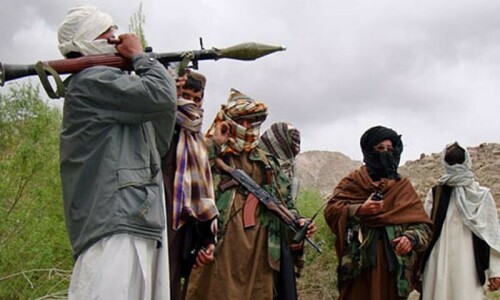Akhtar Balouch, also known as the Kiranchi Wala, ventures out to bring back to Dawn.com’s readers the long forgotten heritage of Karachi. Stay tuned to this space for his weekly fascinating findings.
Continued from previous article, 'The truth behind Karachi's Freemasons'
Popular novelist Dan Brown and some researchers claim that the founder and first President of the United States of America, George Washington, was a member of the Secret Brotherhood of the Freemason fraternity. According to them, even Leonardo Da Vinci, a well-known figure of the Renaissance, was a member of the brotherhood.
One important contributor to the history of art related to this fraternity is the sculptures of the great Gian Lorenzo Bernini.
Bernini made these sculptures for Rome and Vatican on special orders from the new pope, Pope Urban VIII. Although receiving patronage from the pope, he incorporated certain Judaist symbols into his sculptures. In fact, some of these works subtly mock the Papal seal. Bernini’s work can still be seen in Rome.
One of the Freemasons of our own and dear Karachi is Jeevan.
Jeevan had humble beginnings and interestingly took his first breaths within the walls of the Freemason Hall (Hope Lodge). 75 year-old Jeevan’s father was the first employee of the Freemason Hall. When his father passed away, Jeevan’s brother took over the job. He too died soon after. It was then Jeevan’s turn to serve the Freemason Hall.
 |
| The interior of the Freemason Hall, or the Hope Lodge. — Photo by Akhtar Balouch |
At first, Jeevan was quite hesitant to speak to me. He did open up gradually, though. In his words, I could sense the mixed joy and sadness which these memories brought to him.
Here is the conversation we had:
Q. Please tell me about the Freemason Hall, Jeevan.
A. I’ve been through these interviews before. The lawyer has stopped me from saying anything. I’m told that enough has been said already.
Q. How old are you?
A. 74 years.
Q. Is this quarter your birthplace?
A. Yes.
Q. What was your father’s name?
A. They called him Prabhu. I reckon that’s his name.
Q. You’ve served 74 years here. Can you speak a little about the pre and post-partition days and what went on then?
A. Back then, it wasn't like this at all. There was no traffic, just more horse wagons. What else do you want to know?
Members and activities
Q. I want to know what used to happen here. Were there any parties?
A. There were no parties here. These rooms you can see, these were their offices. One of them was their drawing room. Another was their storeroom, while another was a kitchen. Lastly, one room was for the ladies.
Folks would come in the evening and dine in. There wasn’t much more to it. Our own ones (the locals) were always in a small number. Mostly, it would be foreigners. They all went away gradually. Only six or seven remained. It was [the year] 1973. Actually, no one came to stay here permanently. Each one used to work for some big company.
There was an assigned secretary, treasurer and so on. These people would visit regularly and run it [the organisation].
Q. The plaque has the names of Jam Ayoub and Shirazi sahib. Did these people come here often?
A. They must have been visitors from my father’s time here. This organisation always had someone at the helm. After my father passed away, the place was passed down to me and things kept going on.
 |
| The plaque with the names. — Photo by Akhtar Balouch |
I was born here. I have four sons and three daughters and all of them were born here. The conservationists did some rehabilitation of the building. The building is from 1842. Back in those days, its office-holders would care for its cleanliness a lot. That’s why the building is still standing, you know. 1842 was a long time ago. Those people really took care of this building. They wouldn’t take a moment in ordering for a fix whenever anything was broken. And now, look at this place!
Q. These trees here, are these the same old trees?
A. (Pointing in the direction of a tree) That one over there is the oldest. That bush straight ahead, with the berries and all, is over a hundred years old. You know what, one of my uncles is an engineer and lives in India. I went to see him in 1984 and he asked about the berries, the old man. He said he remembered the bush with the berries from 1974. He must have had some berries, that’s why he remembered. When I met him I told him it's still here!
Q. How much did the Freemasons pay you?
A. My pay was in the thousands. There were benefits as well, like medical insurance for me and my family.
Q. Some of the visitors of the hall that you remember?
A. There were a lot of them back in the day. But only a few remained afterwards. One of them was the oldest. He used to work in some big company. He lived on the Zeb-un-Nissa Street. He told the foreigners about me. Back then, we never had any problems. You know why? Because we were the authority. The area all around was just plain ground all the way till Fawara Chowk.
Q. Did people come here and pray?
A. Nope. They would come in the evening and then be gone after a while. They would come around half-past-six in the evening. All of them would dine here, though.
Q. Was there a bar? Did they drink?
A. Yeah, they had their stuff. By eight or nine in the evening, they’d all be gone after having enjoyed a nice meal.
Q. Did they hold any events here?
A. There would be an occasional ladies’ night. In the beginning, they even had a school here.
Q. What happened in the ladies’ night?
A. Well, what do you think happened? There were women. They would eat and talk and so on.
Q. Could you go inside back then?
A. Yes, I went inside. But I didn’t go upstairs. We people did not have any business up there. They would come and go themselves. There was a regular meeting about the expenses.
Q. They call this place the haunted house or the magic house. Why?
A. Nothing like that. Some old folks call it the house of idols. All my friends and family folk know me as the idol house guy. If you tell them you want to see Jeevan, they’d not know who were you talking about. But you tell those folks you’ve come to see Jeevan the idol house guy, they’d bring you to my doorstep. Everybody knows me by that name, no matter what town or city they are in.
After the ban
Q. After the Freemasons were prohibited, did anyone get in touch with you?
A. Yes. The ban came on July 19, 1972. After that, I was jobless. Then a foreigner from the Freemasons came to see me. He was once the secretary here. The poor man met with me sometime between 1973 and 1974. He told me they had no money since all their accounts and assets had been frozen. He gave me a letter that said something about the labour law. Nothing happened after that. I still have the letter.
Q. Does someone [from the fraternity] still come see you?
A. Yes. Some people came from Delhi some time ago. It was a woman. She had a child with her. Don’t know how they came to know that I was a former employee. This was two, three years ago. People keep coming here occasionally.
Q. Were these visitors [from Delhi] Freemasons?
A. No. They had just come [to visit]. There has been a shooting (filming) here, too. Activities like that keep happening.
This road, you know, it was called the R. A. Line, meaning the Royal Air Force Line. They used to call it the Arya Line often.
Q. Was there anything else here apart from the Freemason Hall?
A. There was the YMCA and it was often thronged by people. Not much else.
Proposal to convert Dilip Kumar’s house into national heritage termed ‘unfeasible’
Q. Did you face any problems after the ban on the Freemason fraternity?
A. The wildlife people sent me a notice of eviction in 1993. I wrote letters to the then Commissioner sahib, and a minister called Molana Kausar Niazia. I think that was the name. I told them everything.
Q. Where are you from in India?
A. No, I am from around here. My father was from Surat. My folks had come here in 1904. My mother used to work in the Tata mill there. Then they moved here. Amma would talk sometimes about how tough the move was from them. They came to Karachi and stayed with a relative they happened to have here in Sindh Club. They lived there for some time. Someone told them there was work at the Freemason Hall. Bapu (dad) knew Gujrati but the foreigners only knew English, of course.
I often wonder how Bapu managed to work with them folks. They didn’t know Gujrati or Urdu. They only knew English. They were all goray (white/foreigners). Bapu worked for these people for 45 years. I can’t imagine how he made it through even one day. He got paralysis later. But they [the employers] would have him treated here, even had a house for us.
Then my older brother replaced Bapu. Soon after my marriage, he passed away, too. Then they told me to start working. I used to work as a Clearing and Forwarding agent, but had to quit my job and work here — not because of the money, but because of the house.
Jeevan running from 'Wildlife'
This was Jeevan’s story. Despite all this, even now people are still trying to have Jeevan vacate his residence. The matter is currently in court. The lawyers’ expenses stemming from this legal dispute are a huge burden on Jeevan.
Jeevan also mentioned that people from abroad come visit the place from time to time, but he does not suspect that they are Freemasons. I cannot understand what foreign visitors or tourists would want to do with an old building. Most of Karachi does not know what this building was, so how would some foreigners know what it is is and where to find it? I briefly discussed one of these said foreigners, Mike Bruce, in the previous blog.
The new name of the Hope Lodge will be the Wildlife Museum. It is bewildering to me how easily history is changed with a few names. Gandhi Garden becomes the Zoological Garden, the Freemason Hall becomes the Wildlife Museum. But if Ram Bagh can become Aram Bagh, then I think they can even change Akhtar Balouch to something to their liking. I wonder how long Jeevan will be able to save his home in the Hope Lodge.
Translated by Ayaz Laghari from the original in Urdu.
`
`














































